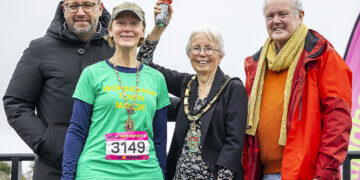Back to Work with Nigel Richards
Whether you are fresh out of school, with neither experience nor a clue about the career path you wish to follow, or an old-hand who has worked in the same job for many years, the first place to start the job-search process is with a CV.
They say never judge a book by its cover, but, when applying for a job, employers will judge you on your resumé and covering letter. So, it’s important to get them right.
This is your chance to show prospective employers who you are. But you have a short time span to catch their attention – about 30 seconds.
Lose them with your opening paragraph and it doesn’t matter how much experience you have, they will already have moved on to the next candidate.
READ MORE: Zooming in on a job
So how do you go about constructing the perfect CV? Brian Stainton, an advisor at the Wokingham Job Support Centre, shares his top three tips (he has plenty more):
• Focus on the job you are applying for: look at the skills they want and the words they use and try to make your CV match, within reason, what they want;
• Use achievements: the interviewer is looking for how well you performed your latest role, with examples as evidence. Use the STAR (situation, task, action, result) approach, rather than a mundane job description;
• Put together a five- to six-line profile: this should include what you are, the sectors you have worked in, what level of responsibility you have held, who you talked with inside and outside of the business, and demonstrate strong characteristics that support you application.
If you feel overwhelmed by the job-searching process or need help with a particular aspect of your job hunting, then WJSC offers free, confidential support, including one-to-one advice.
A first meeting with an advisor gives you the opportunity to set out your needs and wishes, such as the type of role you are looking for, the level of responsibility you would like and so on. Based on your requirements, the advisor will set out a personal action plan, identify what support you need – from reassurance that you are doing the right thing to hands-on help with IT skills, CV writing and practising interviews – and work with you.
Once you have settled on a path, the advisor will help research job requirements, discuss the ‘hot topics’ within a role and advise what you need for your CV and interview. The final decisions are yours; our role is to help you think it through.
Until next time, good luck with your job hunting.
Case study
Mrs X was a PA, who had been made redundant. She was in her last role for many years, so had been out of the job market for some time and was lacking in confidence in applying for jobs and felt she did not have the right experience for them.
She had two one-to-one sessions with a WJSC advisor, who helped to restructure her CV. Mrs X’s revised resumé showcased her skills and experience, increased her confidence when applying for roles.
“I was [seeking] an independent review of my CV and covering letter, so I could see where it was failing short,” she said. “I took the points on board and tailored my CV accordingly.”
As a result, Mrs X soon secured an interview, during which she “used the interview techniques
[the advisor] had helpfully showed me”.
They offered her the job.
For more information, visit www.wjsc.org.uk, tel: 0118 977 0517 or email jobsearch@wjsc.org.uk.
Nigel Richards chairs Wokingham Job Support Centre


















































